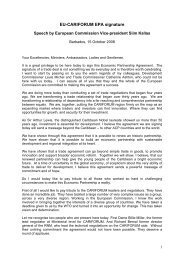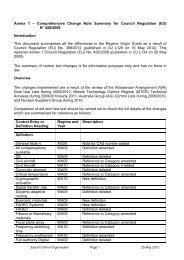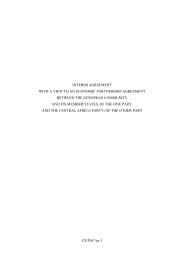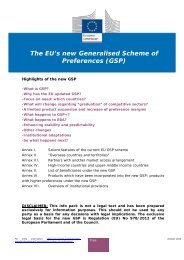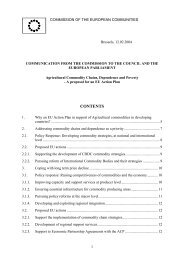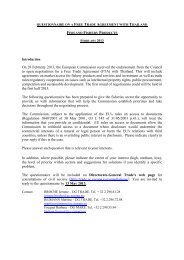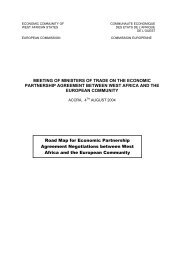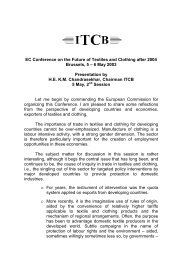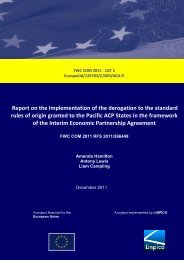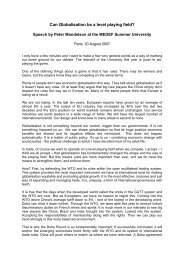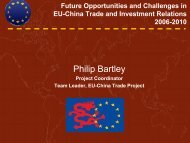EU-India FTA negotiations and access to medicines
EU-India FTA negotiations and access to medicines
EU-India FTA negotiations and access to medicines
Create successful ePaper yourself
Turn your PDF publications into a flip-book with our unique Google optimized e-Paper software.
<strong>EU</strong>-<strong>India</strong> <strong>FTA</strong> <strong>negotiations</strong> <strong>and</strong> <strong>access</strong> <strong>to</strong> <strong>medicines</strong><br />
Questions <strong>and</strong> answers<br />
1. Will the Free Trade Agreement with <strong>India</strong> limit <strong>access</strong> <strong>to</strong> affordable<br />
<strong>medicines</strong> in developing countries<br />
The <strong>EU</strong> fully acknowledges <strong>India</strong>'s right <strong>and</strong> capacity <strong>to</strong> manufacture <strong>and</strong> export<br />
life-saving <strong>medicines</strong> <strong>to</strong> other developing countries facing public health problems.<br />
The IPR provisions proposed in the <strong>EU</strong>-<strong>India</strong> <strong>FTA</strong> are not intended <strong>to</strong> weaken this.<br />
Consequently, the <strong>EU</strong> has proposed a clause in the <strong>negotiations</strong> <strong>to</strong> ensure that<br />
nothing in the proposed agreement would limit <strong>India</strong>'s freedom <strong>to</strong> produce <strong>and</strong><br />
export life-saving <strong>medicines</strong> in accordance with the TRIPS Agreement <strong>and</strong> the<br />
Doha Declaration on the TRIPS Agreement <strong>and</strong> Public Health, notably through<br />
compulsory licensing.<br />
2. Will provisions like data exclusivity delay the availability of generic<br />
<strong>medicines</strong> in <strong>India</strong> <strong>and</strong> in other developing countries<br />
Data exclusivity is important <strong>to</strong> take in<strong>to</strong> account the fact that the development<br />
<strong>and</strong> marketing of a new medicine requires the origina<strong>to</strong>r <strong>to</strong> conduct extensive<br />
research <strong>and</strong> testing, which are very costly <strong>and</strong> often take more than 10 years <strong>to</strong><br />
complete, <strong>and</strong> therefore deserve adequate protection as required by Article 39.3<br />
TRIPS. Negotiations are ongoing on this issue with <strong>India</strong>. But the Commission is<br />
ready <strong>to</strong> show the necessary flexibility here, <strong>and</strong> fully take in<strong>to</strong> account the<br />
specificities of the <strong>India</strong>n legal system, the policy developments on this issue<br />
within <strong>India</strong>, its developing country status <strong>and</strong> the role it plays with regard <strong>to</strong><br />
production of essential generics for the developing world.<br />
3. The implementation of the TRIPS Agreement introduced a 20 year patent<br />
term for <strong>medicines</strong> in <strong>India</strong>. Is the <strong>EU</strong> seeking an extension of this patent<br />
term beyond what is required by TRIPS<br />
Patent term extension is a mechanism <strong>to</strong> address the issue of delays in the<br />
processing of marketing approval applications. Such a mechanism exists in<br />
certain countries including the <strong>EU</strong> <strong>to</strong> compensate drug innova<strong>to</strong>rs for long delays,<br />
during patent life, in the obtaining of marketing approval. As a result of these<br />
delays, the medicine is often available in the market only several years after the<br />
patent application has been filed. Such measure has been considered appropriate<br />
in the <strong>EU</strong>. It gives the right holder effective patent protection up <strong>to</strong> 15 years from<br />
the time the medicinal product first receives marketing authorization.<br />
The issue was suggested for discussion in the <strong>FTA</strong> <strong>negotiations</strong> with <strong>India</strong>. If our<br />
bilateral discussions confirm that the processing of marketing approval<br />
applications in <strong>India</strong> is not a major concern, then the <strong>EU</strong> would not pursue the<br />
issue of supplementary protection any longer. Preliminary information indicates<br />
indeed that market authorizations in <strong>India</strong> are h<strong>and</strong>led in an expeditious manner.
4. Does data exclusivity hamper the effective use of a compulsory licence<br />
In other words, does data exclusivity apply with regard <strong>to</strong> a compulsory<br />
licensee or would compulsory licences override data exclusivity<br />
Data exclusivity will not hamper the effective use of a compulsory licence. The <strong>EU</strong><br />
has proposed a clause that will guarantee that no provision of the <strong>FTA</strong> will prevent<br />
<strong>India</strong> from using the flexibilities contained in the TRIPS Agreement. More<br />
specifically, in case of conflict between data exclusivity rules <strong>and</strong> compulsory<br />
licensing, the latter would override the former.<br />
5. How will the Commission guarantee that legitimate generic <strong>medicines</strong><br />
are not unfairly delayed when in transit through the <strong>EU</strong><br />
As regards enforcement <strong>and</strong> border measures, the agreement will not deal with<br />
generic <strong>medicines</strong> in transit. Regulation 1383/2003 concerning cus<strong>to</strong>ms action<br />
against goods suspected of infringing certain intellectual property rights is<br />
currently being reviewed. The Commission is prepared <strong>to</strong> propose modifications<br />
<strong>to</strong> the Regulation that may be necessary <strong>to</strong> clarify the procedures relating <strong>to</strong><br />
<strong>medicines</strong> in transit <strong>to</strong> ensure that generic <strong>medicines</strong> are not unnecessarily<br />
affected when merely transiting the <strong>EU</strong>. This principle will also be reflected in the<br />
IPR chapter <strong>to</strong> be agreed with <strong>India</strong>.<br />
6. What is the <strong>EU</strong> doing <strong>to</strong> s<strong>to</strong>p fake <strong>medicines</strong> risking health of <strong>EU</strong> citizens<br />
or of citizen's in third countries<br />
<strong>EU</strong> cus<strong>to</strong>ms are empowered <strong>to</strong> detain goods suspected of infringing intellectual<br />
property rights under Regulation 1383/2003.<br />
Moreover, <strong>EU</strong> law on pharmaceuticals obliges the importer of a medicine <strong>to</strong> do a<br />
quantitative <strong>and</strong> qualitative assessment of each batch of <strong>medicines</strong>, in order <strong>to</strong><br />
ensure compliance with the <strong>EU</strong> laws on <strong>medicines</strong>. Every importer has <strong>to</strong> be<br />
holder of an authorisation <strong>and</strong> is subject <strong>to</strong> inspections. Recently, the Commission<br />
has proposed amendments <strong>to</strong> the <strong>EU</strong> law on pharmaceuticals <strong>to</strong> address in<br />
particular the prevention of the entry in<strong>to</strong> the legal supply chain of medicinal<br />
products which are falsified in relation <strong>to</strong> their identity, his<strong>to</strong>ry or source.<br />
7. Will the <strong>FTA</strong> contain other provisions that go beyond the TRIPS<br />
Agreement<br />
The TRIPS Agreement dates back more than 10 years. In the meantime, new<br />
challenges have emerged (e.g. biodiversity-related issues, protection of traditional<br />
knowledge) <strong>and</strong> technical development has overtaken the agreement (e.g. digital<br />
environment). There is also a change as regards the economic importance of<br />
certain rights. There is for example a growing interest in designs <strong>and</strong> geographical<br />
indications.<br />
Therefore where <strong>India</strong> <strong>and</strong> the <strong>EU</strong> have a shared interest in issues that<br />
complement or clarify the TRIPs Agreement, these will be included in the <strong>FTA</strong>.
8. Does the <strong>EU</strong> take in<strong>to</strong> account the needs <strong>and</strong> level of development of its<br />
partners in negotiating IPR chapters in its <strong>FTA</strong>s<br />
Yes, of course. Whilst the overall objective is <strong>to</strong> improve the IPR situation in third<br />
markets <strong>to</strong> enable European companies <strong>to</strong> operate <strong>and</strong> compete in a legally<br />
secure environment, the <strong>EU</strong> is open <strong>to</strong> take in<strong>to</strong> account the specific legal <strong>and</strong><br />
economic situation of its trading partners.<br />
9. What is the status of the <strong>negotiations</strong> with <strong>India</strong> What is the timetable<br />
for conclusion <strong>and</strong> when would it come in<strong>to</strong> force<br />
The 9 th round of <strong>negotiations</strong> was held from 28-30 April, where both sides<br />
confirmed the objective of concluding <strong>negotiations</strong> swiftly – if possible even by the<br />
time of the <strong>EU</strong>-<strong>India</strong> Summit this year. Having said this, a number of issues still<br />
need <strong>to</strong> be solved <strong>and</strong> getting the substance right is the ultimate benchmark. As<br />
regards intellectual property, the <strong>negotiations</strong> are still at an early stage. It should<br />
be possible <strong>to</strong> advance quickly on IP given the high level of mutual underst<strong>and</strong>ing<br />
<strong>and</strong> interest in this issue.<br />
10. What is the Commission doing <strong>to</strong> promote <strong>access</strong> <strong>to</strong> <strong>medicines</strong> in<br />
developing countries<br />
The Commission is doing a lot <strong>to</strong> promote <strong>access</strong> <strong>to</strong> <strong>medicines</strong> in developing<br />
countries. The <strong>EU</strong> is the biggest provider of resources <strong>to</strong> support health policies in<br />
developing countries.<br />
Projects <strong>and</strong> programs funded by the <strong>EU</strong> in developing countries cover a wide<br />
range of activities: research, production, procurement <strong>and</strong> delivery, including<br />
quality control. The <strong>EU</strong> is associated with a number of WHO programmes for R&D<br />
<strong>and</strong> capacity building. The <strong>EU</strong> is also one of the oldest <strong>and</strong> biggest contribu<strong>to</strong>rs <strong>to</strong><br />
the Global Fund <strong>to</strong> Fight AIDS, Tuberculosis <strong>and</strong> Malaria <strong>and</strong> has donated €872m<br />
since 2002. Under its Co-operation Program of the 7 th R&D Framework Program<br />
(2007-2013), the <strong>EU</strong> has allocated a <strong>to</strong>tal of €6.1b <strong>to</strong> health R&D worldwide.<br />
More recently, in its Communication on <strong>EU</strong> role in global health, adopted on 31<br />
March 31 2010, the Commission renewed its commitment <strong>and</strong> its call <strong>to</strong> <strong>EU</strong><br />
Member States <strong>to</strong> strengthen the coherence between its policies with regards <strong>to</strong><br />
development, <strong>and</strong> more specifically on drugs related issues (TRIPS, WHO<br />
Strategy, etc.).<br />
The <strong>EU</strong> has actively participated in the WHO work <strong>to</strong> address urgent health needs<br />
in developing countries, in particular the Global Strategy <strong>and</strong> Plan of Action on<br />
Public Health, Innovation <strong>and</strong> Intellectual Property. The <strong>EU</strong> has played a key role<br />
as facilita<strong>to</strong>r in order <strong>to</strong> reach consensus on the most contentious issues.<br />
The <strong>EU</strong> has also been active in the WTO debate on TRIPS <strong>and</strong> <strong>access</strong> <strong>to</strong><br />
<strong>medicines</strong> <strong>and</strong> has been one of the main promoters of the Doha Declaration on<br />
the TRIPS Agreement <strong>and</strong> Public Health. The <strong>EU</strong> supports the flexibilities<br />
contained in the TRIPS Agreement. In order <strong>to</strong> fulfil its WTO commitments, the<br />
<strong>EU</strong> has implemented at the <strong>EU</strong> level the WTO decision allowing the manufacture
<strong>and</strong> export under compulsory licence of generic <strong>medicines</strong> <strong>to</strong> developing<br />
countries with health problems <strong>and</strong> without sufficient production capacities<br />
(Regulation 816/2006). The <strong>EU</strong> has also accepted the Pro<strong>to</strong>col amending the<br />
TRIPS Agreement <strong>to</strong> make this solution permanent, <strong>and</strong> deposited its instrument<br />
of acceptance on 30 November 2007.<br />
Beyond its international obligations, the <strong>EU</strong> has unilaterally set up a tiered-pricing<br />
mechanism for the supply of cheaper <strong>medicines</strong> <strong>to</strong> developing countries<br />
(Regulation 953/2003).<br />
-------------------




